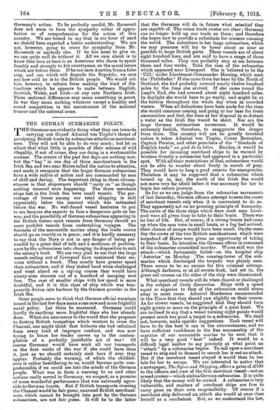THE GERMAN SUBMARINE POLICY.
rilHE Germans are evidently doing what they can towards 1 carrying out Grand Admiral von Tirpitz's threat of paralysing British trade by submarine attacks on merchant- men. They wilt not be able to do very much ; but let us admit that what little is possible of their scheme of wild illegality, if not of crime, they are doing in a workmanlike manner. The events of the past few days are nothing new, but the " bag " in one day of three merchantmen in the Irish Sea and two near Havre called the nation to attention, and made it recognize that the larger German submarines have a wide radius of action and are commanded by men of skill and daring. The important thing in these circum- stances is that shipowners should " carry on " as though nothing unusual were happening. The three merchant ships lost in the Irish Sea were small vessels. The per- centage of losses among our total shipping is still appreciably below the amount which was estimated before the war. No well-found vessel hesitates to put to set because she expects to face a dangerous gale on her way, and the possibility of German submarines appearing in the British waters most remote from Germany should no more prohibit vessels from undertaking voyages. The business of the mercantile marine along the trade routes should go on exactly as in peace; and it is hardly necessary to say that the Navy is not in any danger of being per- suaded by a great deal of talk and a modicum of perform- ance by the submarines into changing its disposition to suit the enemy's book. We are very glad to see that the large vessels sailing out of Liverpool have continued their ser- vices without a break. They mostly have greater speed than submarines, and if they stoked hard when challenged and went ahead on a zig-zag course they would have ninety-nine chances out of a hundred of escaping scot free. The case of smaller ships with low speed is more doubtful, and it is this class of ship which was tem- porarily driven into harbour by the German prowler in the Irish Sea.
Some people seem to think that German official warnings issued in the last few days mean some ne w and more frightful naval policy. Let them be reassured. Germany could hardly do anything more frightful than she has already done. When she announces to the world that she proposes to destroy British troopships which venture to cross the Channel, one might think that hitherto she bad refrained from every kind of improper conduct, and was now trying to brace her tender nerves up to the contem- plation of a perfectly justifiable act of war ! Of course Germany would have sunk all our transports in the first weeks of the war if she could have done it, just as we should certainly sink hers if ever they appear. Probably the warning, of which the childish- ness is rather bewildering to us, would become quite com- prehensible if we could see into the minds of the German people. What was in form a warning to us and other nations really served in Germany, we suspect, as a promise of some wonderful performance that was extremely agree- able to German hearts. But if British transports crossing the Channel would be fair game, unarmed British merchant- men, which cannot be brought into port by the German submarines, are not fair game. It will be to the latter that the Germans will do in future what mischief they are capable of. The ocean trade routes are clear ; Germany can no longer hold up our trade on them; and therefora she hopes now to provide a substitute for cruisers roaming the world. The substitute is her large submarines, which we may presume will try to hover about as near as possible to large British ports. These vessels are of about eight hundred tons, and are said to have a range of three thousand miles. They can probably stay at sea between three and four weeks. Take the case of the submarine which appeared near Liverpool. She is believed to be the U2/, under Lieutenant-Commander Horsing, which sank the 'Pathfinder.' If she came from her base by the North of Scotland, she had probably covered nearly twelve hundred miles by the time she arrived. If she came round the Land's End, she had covered about eight hundred miles. In daylight she would have to go warily, and might lie at the bottom throughout the whole day when in crowded waters. When all deductions have been made for the time she would consume coming and going to her base for fresh ammunition and fuel, the time at her disposal in so distant a water as the Irish Sea would be short. Nor are the large German submarines numerous. It would be extremely foolish, therefore, to exaggerate the danger from them. The country will not be greatly troubled unless it takes Admiral von Tirpitz, Count Reventlow, Captain Persius, and other preachers of the " blockade of English trade" an pied de la lettre. Besides, it would be possible for incoming merchant ships to be warned by wireless directly a submarine had appeared in a particular spot. With all their restrictions of fuel, submarines would not be able to wander about freely in search of prey. They would have to keep a good reserve for emergencies. Therefore it may be supposed that a submarine which turned up in, say, the north of the Irish Sea would not move very far afield before it was necessary for her to begin her return journey.
So far as we can judge from the submarine movements of last Saturday, German officers attempt to save the crews of merchant vessels only when it is convenient to do so. They apparently act on no pressing principle of humanity. The crews of the three ships which were sunk near Liver- pool were all given time to take to their boats. There was no loss of life. But, of course, if a strong breeze had come up when the men were Menial/ boats, or a fog had arrived, their chance of escape would have been small. On the same day the crews of the two British merchantmen which were torpedoed off Havre were given no opportunity of taking to their boats. In intention the German officer in command of the submarine committed murder. Worse still was the attack—which fortunately failed—on the hospital ship 'Asturias' on Monday. The conning-tower of the sub- marine which discharged the torpedo was plainly seen. There seems to be no excuse for this criminal outrage. Although darkness, or at all events dusk, had set in, the great red crosses on the sides of the ship were illuminated.
What merchant vessels will do when chased or challenged is the subject of lively discussion. Ships with a speed equal or superior to that of the submarine could steam away in most cases. Admiral Henderson recommended in the Times that they should yaw slightly on their course. As for slower vessels, he suggested that they should turn eight points or more on the principle of a punt hunt. We are inclined to say that a vessel turning eight points would present much too good a target to a submarine. We shall not, however, make specific suggestions. Each vessel will have to do the best it can in the circumstances, and we have sufficient confidence in the fine seamanship of the captains of our mercantile marine to be sure that it will be a very good " best" indeed. It would be a difficult legal matter to say precisely at what point an " attack " by a submarine begins. To call upon a merchant vessel to stop and to demand to search her is not an attack. But if the merchant vessel obeyed it would then be too late for her to escape. We are interested to notice that a newspaper, The Syren and Shipping, offers a prize of .fifitNi to the officers and crew of the first merchant vessel—not an at cruiser—which sinks &German submarine. It is quite likely that the money will be earned. A submarine is very vulnerable, and masters of merchant ships are free to carry guns on their own responsibility. Of course if a merchant ship delivered an attack she would at once class herself as a combatant. But, as we understand the law,
the decision of a master here and there to defend himself by this or that expedient in an emergency could not affect the rights (so far as the Germans allow any rights) of the mercantile marine as a whole. Those rights could be abolished only if the Government in effect turned the mercantile marine into a combatant service. The Germans might take another view, but it has almost ceased to be worth while to follow their vagaries in disregarding civilized custom while making out for themselves a semblance of legality.







































 Previous page
Previous page